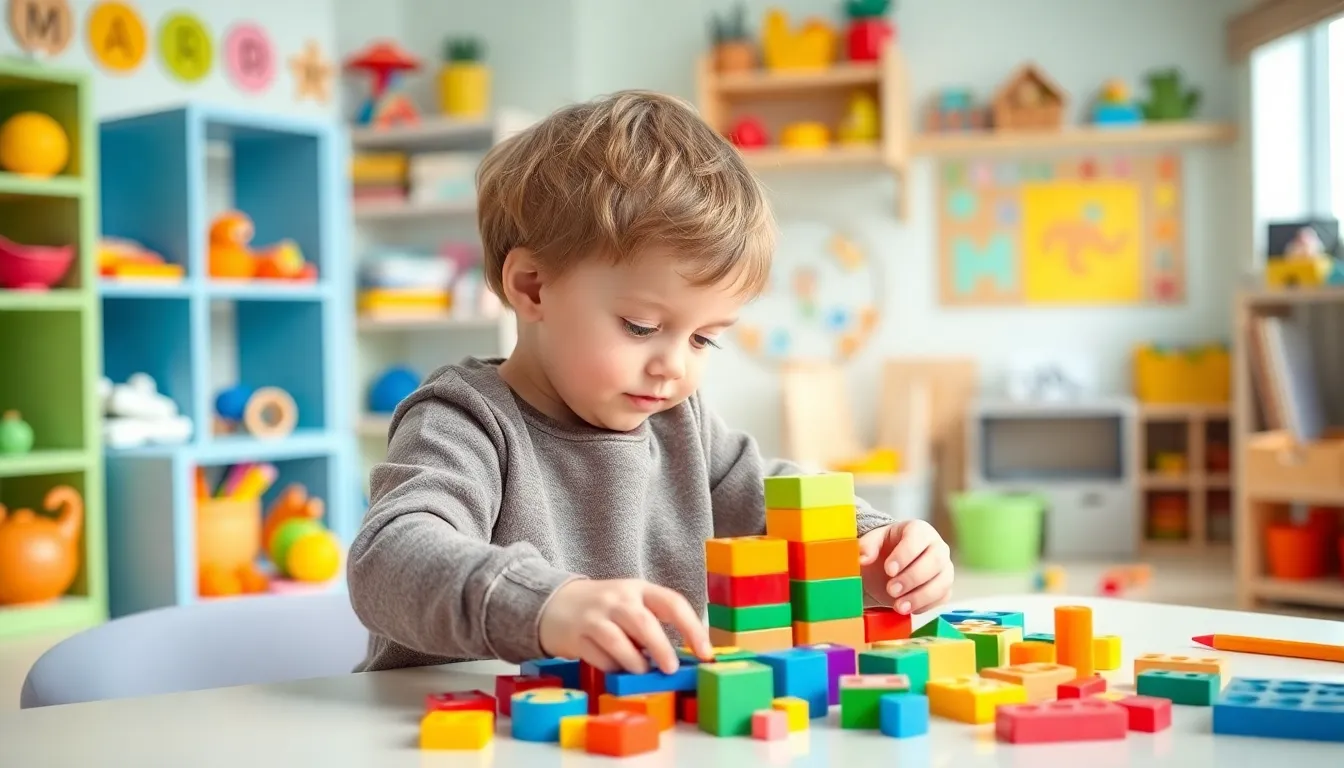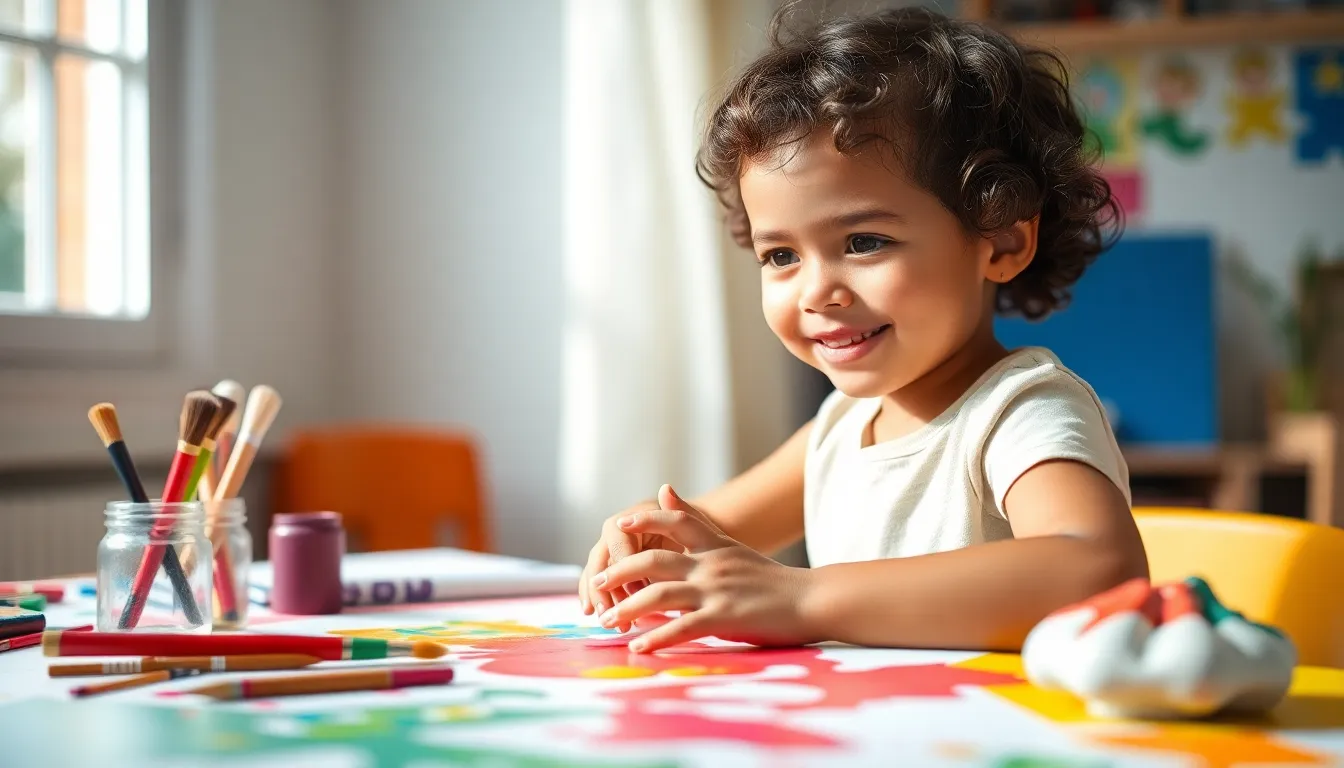Fine motor skills might not sound like the most thrilling topic, but they’re the secret sauce to a child’s development. Imagine tiny fingers mastering the art of grasping, pinching, and manipulating objects—skills that can turn a simple crayon into a masterpiece or a puzzle piece into a triumphant victory. It’s like watching a mini Picasso in action, but with a lot more giggles and a bit of mess.
Engaging in fine motor skills activities isn’t just beneficial; it’s downright fun! From finger painting to building with blocks, these activities unleash creativity while sharpening coordination. So, why not turn playtime into a fine motor skills extravaganza? Let’s dive into some delightful activities that’ll have kids laughing, learning, and honing those tiny talents, all while parents sit back and marvel at their little ones’ newfound dexterity.
Table of Contents
ToggleWhat Are Fine Motor Skills?
Fine motor skills involve the coordination of small muscles in movements that require precision. These skills play a crucial role in tasks such as writing, buttoning shirts, and using utensils. Children refine these skills through repetitive activities that promote strength and dexterity in their hands and fingers.
The development of fine motor skills begins early in life. Infants grasp objects, which lays the foundation for more complex tasks later. As children grow, they engage in activities such as drawing or building, which enhance their ability to manipulate tools.
Several milestones mark the progression of fine motor skills. For example, at 3 years old, most children can copy simple shapes and use scissors with assistance. By age 5, they often demonstrate improved control, managing to write their names and draw more intricate designs.
Incorporating fine motor skill activities can significantly aid development. Tasks such as threading beads, playing with clay, or engaging in puzzle games provide the necessary practice. These activities not only improve fine motor skills but also promote cognitive development and problem-solving abilities.
Parents can encourage fine motor skill growth by providing a variety of materials and tools for their children. When combining play with learning, it’s possible to foster an environment where children enhance their fine motor skills while enjoying themselves.
Importance Of Fine Motor Skills Activities

Fine motor skills activities play a vital role in a child’s overall development. These activities not only enhance coordination but also offer endless opportunities for fun and creativity.
Developmental Benefits
Development of fine motor skills supports a child’s ability to perform everyday tasks. Engaging in activities like building with blocks improves hand strength and dexterity. Children learn to manipulate small objects, which enhances their grip and control. While playing with clay, they develop their hand-eye coordination, crucial for tasks like writing. Additionally, mastering activities such as cutting and pasting contributes to cognitive growth. As children progress, they gain confidence in their abilities, fostering independence and self-esteem.
Academic Performance
Fine motor skills directly impact academic performance in various subjects. Writing legibly requires precise hand movements, which develop through activities that strengthen these skills. Children who engage in fine motor activities often show greater success in early literacy and math tasks. Utilizing scissors for arts and crafts helps them refine their grip and control, essential for neat handwriting. Furthermore, improved fine motor skills can enhance focus and attention in the classroom. As competence increases, the likelihood of academic success also rises.
Types Of Fine Motor Skills Activities
Engaging in fine motor skills activities promotes hand-eye coordination and dexterity in children. Various activities can encourage development in this area.
Arts And Crafts
Arts and crafts stimulate creativity while refining fine motor skills. Activities like cutting paper, gluing shapes, and painting require precise hand movements. Children learn to manipulate different materials, which strengthens their grip and control. Knitting or sewing enhances coordination, encouraging focus and patience in young learners. Moreover, coloring within lines fosters excellent pencil control, critical for writing. Incorporating a variety of art supplies keeps children interested and engaged.
Practical Life Skills
Practical life skills activities provide essential daily tasks that build fine motor skills. Pouring liquids, buttoning shirts, or zipping jackets require concentration and precision. Children gain confidence as they master these skills, fostering independence. Tasks like tying shoelaces promote critical thinking as kids navigate challenges. Setting the table or cooking simple recipes combines fun with learning, further enhancing dexterity. These activities help children understand responsibility while developing coordination through real-world applications.
Tips For Implementing Activities At Home
Engaging in fine motor skills activities at home offers children fun learning experiences. Parents can use simple strategies to support this development effectively.
Age-Appropriate Suggestions
Infants benefit from grasping soft toys and simple objects, promoting hand strength and coordination. Toddlers can attempt activities like stacking blocks or using large crayons for coloring, which enhances control. By age three, children can enjoy cutting paper with safety scissors and participating in basic threading tasks, both of which improve dexterity. Preschoolers thrive on more challenging activities, such as using tweezers to pick up small objects or practicing lacing cards, building precision. Each activity caters to children’s developmental stages, enabling targeted skill growth.
Incorporating Play
Utilizing play in fine motor skills activities makes learning enjoyable. Toys like building blocks or play dough encourage creativity while refining hand movements. Gardens or kitchens offer natural settings where children pour, scoop, and mix, enhancing their motor control. Interactive games like puzzles require hand-eye coordination, making the process both educational and fun. By blending play with skill development, parents create engaging and rewarding opportunities for children to learn and grow, fostering a love for exploration.
Fine motor skills are essential for children’s development and play a significant role in their everyday lives. By engaging in a variety of fun activities that promote these skills, parents can support their children’s growth while fostering creativity and independence. Incorporating play into fine motor skill development not only enhances dexterity but also builds confidence and cognitive abilities. As children explore and manipulate their environment, they gain valuable skills that will benefit them academically and socially. Prioritizing these activities ensures a well-rounded approach to learning that keeps children engaged and excited about their development.

